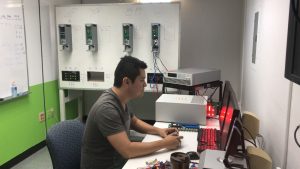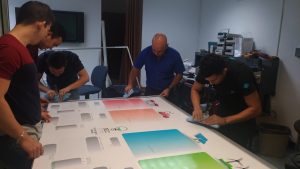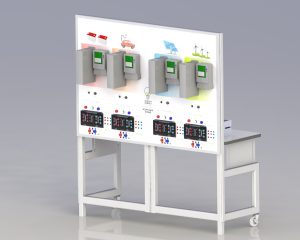Award #Abstract #1828443
![]() MRI: Development of a Real-world Microgrid Simulation/Testing Instrument
MRI: Development of a Real-world Microgrid Simulation/Testing Instrument
Microgrids are a powerful means of increasing the use of Renewable-Energy-Sources (RES), an important part of the evolution of both Smart Grids and distribution systems. The proposed microgrid testbed is an experimental and educational platform for companies, communities and research institutions that are developing solutions for the integration of RES and intelligent appliances. The microgrid testbed promotes the progress of science and fosters prosperity and welfare by advancing the integration of RES into the existing electric-grid while increasing the reliability of the grid. It will improve the overall energy efficiency by reducing peak-capacity requirements using developed techniques like demand-side management and new tools such as smart plug-in-vehicles deployment. This contributes to advance the state-of-the-art in microgrid infrastructure research. Results can improve future designs and deployments of microgrids while supporting the NSF-mission to promote the progress of science.



 The microgrid testbed integrates experimental research, development and education platforms in a single operational system. It is designed to run experiments at all levels of controls to conduct research on microgrids and smart grids, RES, energy storage, visualization of scenarios, cooperative control among distributed generators, and energy management systems. The facility is composed of a real-time simulator (RT-Lab) and an inverter-based setup, two electronic DC power-sources, loads, a 1kW PV-array on the rooftop of the building and two computers. The setup consists of four inverter-based-generators controlled by intelligent controllers and the RT-Lab to make them flexible enough to simulate DC and AC microgrids. One inverter-based-generator has a back-to-back configuration to emulate different kinds of energy sources and analyze the behavior in the DC-link. The system can also be connected to the public grid to test interactions between both. Further, the system will have capabilities to program some faults and test power quality problems. One of the key capabilities of the facility is the flexibility to change the software and firmware of each converter by using open firmware converters and intelligent control units. This provides a platform to attract researchers, government agencies and the community into microgrid-related activities.
The microgrid testbed integrates experimental research, development and education platforms in a single operational system. It is designed to run experiments at all levels of controls to conduct research on microgrids and smart grids, RES, energy storage, visualization of scenarios, cooperative control among distributed generators, and energy management systems. The facility is composed of a real-time simulator (RT-Lab) and an inverter-based setup, two electronic DC power-sources, loads, a 1kW PV-array on the rooftop of the building and two computers. The setup consists of four inverter-based-generators controlled by intelligent controllers and the RT-Lab to make them flexible enough to simulate DC and AC microgrids. One inverter-based-generator has a back-to-back configuration to emulate different kinds of energy sources and analyze the behavior in the DC-link. The system can also be connected to the public grid to test interactions between both. Further, the system will have capabilities to program some faults and test power quality problems. One of the key capabilities of the facility is the flexibility to change the software and firmware of each converter by using open firmware converters and intelligent control units. This provides a platform to attract researchers, government agencies and the community into microgrid-related activities.
This award reflects NSF’s statutory mission and has been deemed worthy of support through evaluation using the Foundation’s intellectual merit and broader impacts review criteria.
